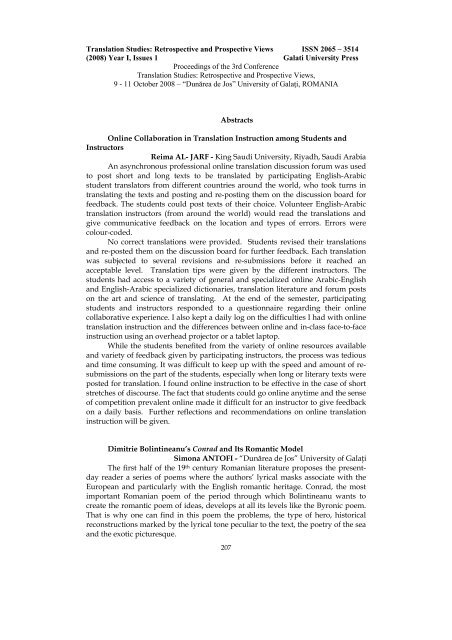translation studies. retrospective and prospective views
translation studies. retrospective and prospective views
translation studies. retrospective and prospective views
Create successful ePaper yourself
Turn your PDF publications into a flip-book with our unique Google optimized e-Paper software.
Translation Studies: Retrospective <strong>and</strong> Prospective Views ISSN 2065 – 3514<br />
(2008) Year I, Issues 1 Galati University Press<br />
Proceedings of the 3rd Conference<br />
Translation Studies: Retrospective <strong>and</strong> Prospective Views,<br />
9 - 11 October 2008 – “Dunărea de Jos” University of Galaţi, ROMANIA<br />
Abstracts<br />
Online Collaboration in Translation Instruction among Students <strong>and</strong><br />
Instructors<br />
Reima AL- JARF - King Saudi University, Riyadh, Saudi Arabia<br />
An asynchronous professional online <strong>translation</strong> discussion forum was used<br />
to post short <strong>and</strong> long texts to be translated by participating English-Arabic<br />
student translators from different countries around the world, who took turns in<br />
translating the texts <strong>and</strong> posting <strong>and</strong> re-posting them on the discussion board for<br />
feedback. The students could post texts of their choice. Volunteer English-Arabic<br />
<strong>translation</strong> instructors (from around the world) would read the <strong>translation</strong>s <strong>and</strong><br />
give communicative feedback on the location <strong>and</strong> types of errors. Errors were<br />
colour-coded.<br />
No correct <strong>translation</strong>s were provided. Students revised their <strong>translation</strong>s<br />
<strong>and</strong> re-posted them on the discussion board for further feedback. Each <strong>translation</strong><br />
was subjected to several revisions <strong>and</strong> re-submissions before it reached an<br />
acceptable level. Translation tips were given by the different instructors. The<br />
students had access to a variety of general <strong>and</strong> specialized online Arabic-English<br />
<strong>and</strong> English-Arabic specialized dictionaries, <strong>translation</strong> literature <strong>and</strong> forum posts<br />
on the art <strong>and</strong> science of translating. At the end of the semester, participating<br />
students <strong>and</strong> instructors responded to a questionnaire regarding their online<br />
collaborative experience. I also kept a daily log on the difficulties I had with online<br />
<strong>translation</strong> instruction <strong>and</strong> the differences between online <strong>and</strong> in-class face-to-face<br />
instruction using an overhead projector or a tablet laptop.<br />
While the students benefited from the variety of online resources available<br />
<strong>and</strong> variety of feedback given by participating instructors, the process was tedious<br />
<strong>and</strong> time consuming. It was difficult to keep up with the speed <strong>and</strong> amount of resubmissions<br />
on the part of the students, especially when long or literary texts were<br />
posted for <strong>translation</strong>. I found online instruction to be effective in the case of short<br />
stretches of discourse. The fact that students could go online anytime <strong>and</strong> the sense<br />
of competition prevalent online made it difficult for an instructor to give feedback<br />
on a daily basis. Further reflections <strong>and</strong> recommendations on online <strong>translation</strong><br />
instruction will be given.<br />
Dimitrie Bolintineanu’s Conrad <strong>and</strong> Its Romantic Model<br />
Simona ANTOFI - “Dunărea de Jos” University of Galaţi<br />
The first half of the 19 th century Romanian literature proposes the presentday<br />
reader a series of poems where the authors’ lyrical masks associate with the<br />
European <strong>and</strong> particularly with the English romantic heritage. Conrad, the most<br />
important Romanian poem of the period through which Bolintineanu wants to<br />
create the romantic poem of ideas, develops at all its levels like the Byronic poem.<br />
That is why one can find in this poem the problems, the type of hero, historical<br />
reconstructions marked by the lyrical tone peculiar to the text, the poetry of the sea<br />
<strong>and</strong> the exotic picturesque.<br />
207












